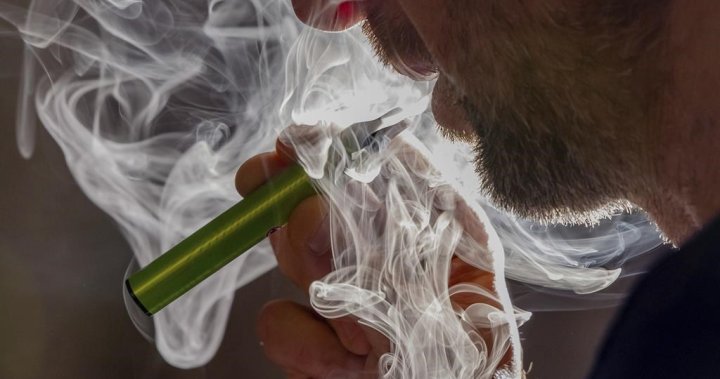Several tobacco control organizations are renewing their calls on the federal government to put a ban on flavoured vaping products as a new Parliament begins and a new health minister settles into their role.
That comes as data over recent years has shown half of Canadian young adults have tried vaping, and after previous health minister Mark Holland took aim at the tobacco industry during the previous Parliament, telling it to “stay the hell away from our kids.”
Action on Smoking and Health, the Quebec Coalition for Tobacco Control and Physicians for a Smoke-Free Canada called on Health Minister Marjorie Michel to finalize regulations first put forward in 2021 that would prohibit flavours, except for tobacco, mint and menthol, from being added to e-cigarettes.
However, the group said it wants those regulations further strengthened to prohibit all but tobacco flavours and for it to happen in Michel’s first 100 days in office.
“Let’s be clear, we’re not calling for a ban on all vaping products, but only for a ban on flavoured versions that make them interesting and highly appealing to youth,” said Flory Doucas, co-director of the Quebec Coalition for Tobacco Control.
Flavoured vaping products have been a topic of discussion among governments for years and the regulations noted by the groups was a promise made by Ottawa in 2021.
Three years later, no such restrictions exist on a national level, but the promise has remained amid a broader federal push to crack down on the sale and appeal of new forms of nicotine for youth, including a ban on flavoured nicotine pouches put in place last year.
“We cannot afford for this government to sit on its hands or take the same laissez-faire approach to the tobacco and nicotine industry as its predecessor,” Cynthia Callard, executive director of Physicians for a Smoke Canada, said in a press release.

Les Hagen, executive director of Action on Smoking and Health, went on to criticize tobacco companies.
“Tobacco and nicotine companies are driving the youth vaping epidemic and they can’t be trusted,” Hagen said Monday morning.

Get weekly health news
Receive the latest medical news and health information delivered to you every Sunday.
“Canada’s three largest tobacco companies recently conceded to a $32-billion penalty to provincial governments for decades of deceptive marketing behaviour. Despite this penalty, it’s still business as usual for the industry.”
That $32.5-billion settlement was approved by an Ontario judge in March and would see provinces, territories and former smokers compensated by JTI-Macdonald Corp., Rothmans, Benson & Hedges and Imperial Tobacco Canada Ltd.
In October 2024, a spokesperson for then-minister of mental health and addictions minister Ya’ara Saks said the commitment remains, but that the delay was in part due to wanting to ensure a national framework works.
Saks’ office pointed to jurisdictions like Quebec, where it said the province’s ban on flavoured vapes led to an accessible illicit market, adding that other jurisdictions’ own plans would inform “future action.”
Quebec’s ban prohibits the sale of any vape except for tobacco flavour and those that have no flavour or aroma.

Global News reached out to Michel’s office for an update on the government’s stance but did not hear back by publication.
Imperial Tobacco Canada’s vice-president of corporate and regulatory affairs, Eric Gagnon, on Monday told reporters that the company’s stance is similar to the groups in terms of prohibiting anyone underage from vaping.
He said it also supports the federal government’s regulations to limit flavours to tobacco, mint and menthol and wants to see further restrictions, including on the size and volume of devices and addressing the “growing online market.”

The company also said in a release that any regulations must be reviewed from an “evidence-based scientific perspective.”
Gagnon added that any regulations must be accompanied by enforcement, something he criticized the anti-tobacco groups for missing.
“Unfortunately, the health groups that spoke before believe their job is done once new regulation is introduced without any concern about the illegal market taking over,” he said.
The Canadian Tobacco and Nicotine Survey released by Statistics Canada in September 2023 showed that nearly half of young adults aged 20-24 and one-third of 15- to 19-year-olds have tried vaping at least once.
It also showed that almost 40 per cent of those 15 and older who vaped in the previous 30 days from when the survey was conducted said they had never smoked previously.
© 2025 Global News, a division of Corus Entertainment Inc.






